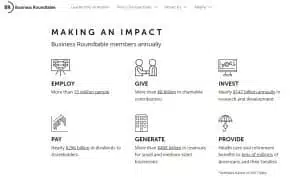In 1962, Nobel prize-winning economist Milton Friedman wrote in his book Capitalism and Freedom, “There is one and only one social responsibility of business ─ to use its resources and engage in activities designed to increase its profits [..]”. Many years later, the most influential lobbying body for U.S. business interests, the Business Roundtable, established Friedman’s doctrine in their 1997 statement, by confirming that the main objective of a business enterprise was to generate economic returns for its owners.
However, times have changed. At a moment when Senator Elizabeth Warren and Bernie Sanders are really pointing fingers at business, CEOs finally realized they needed to try to recast the public’s perception of what it is business is here for:
Finally, businesses are getting around to saying, maybe that’s not all we’re supposed to be doing. Maybe we do need to be taking care of our workers. Maybe we do need to be taking care of the environment. Maybe we do need to be taking our suppliers and treating them fairly.
While each version of the document since 1997 has endorsed what is called the principle of “shareholder primacy,” meaning that corporations exist principally to serve shareholders, on August 19th, 2019, the Business Roundtable issued a new statement that is nothing short of radical in its near-unanimous endorsement.
The 2019 statement supersedes all previous statements and outlines a modern standard for corporate responsibility, which focuses on stakeholders rather than shareholders:
While each of our individual companies serves its own corporate purpose, we share a fundamental commitment to all of our stakeholders. We commit to:#1 ─ Delivering value to our customers.
#2 ─ Investing in our employees.
#3 ─ Dealing fairly and ethically with our suppliers.
#4 ─ Supporting the communities in which we work.
#5 ─ Generating long-term value for shareholders.
Yes, you’ve read it: customers and employees, in the future, should come first while shareholders are supposed to come in fifth place. But, really?

We think it’s fair to say that the odds are very much against them, but let’s be positive and give these guys the benefit of the doubt and see if they are indeed willing to put their attention and money to where their mouth is. We cross our fingers ─ on behalf of all parties concerned.


























